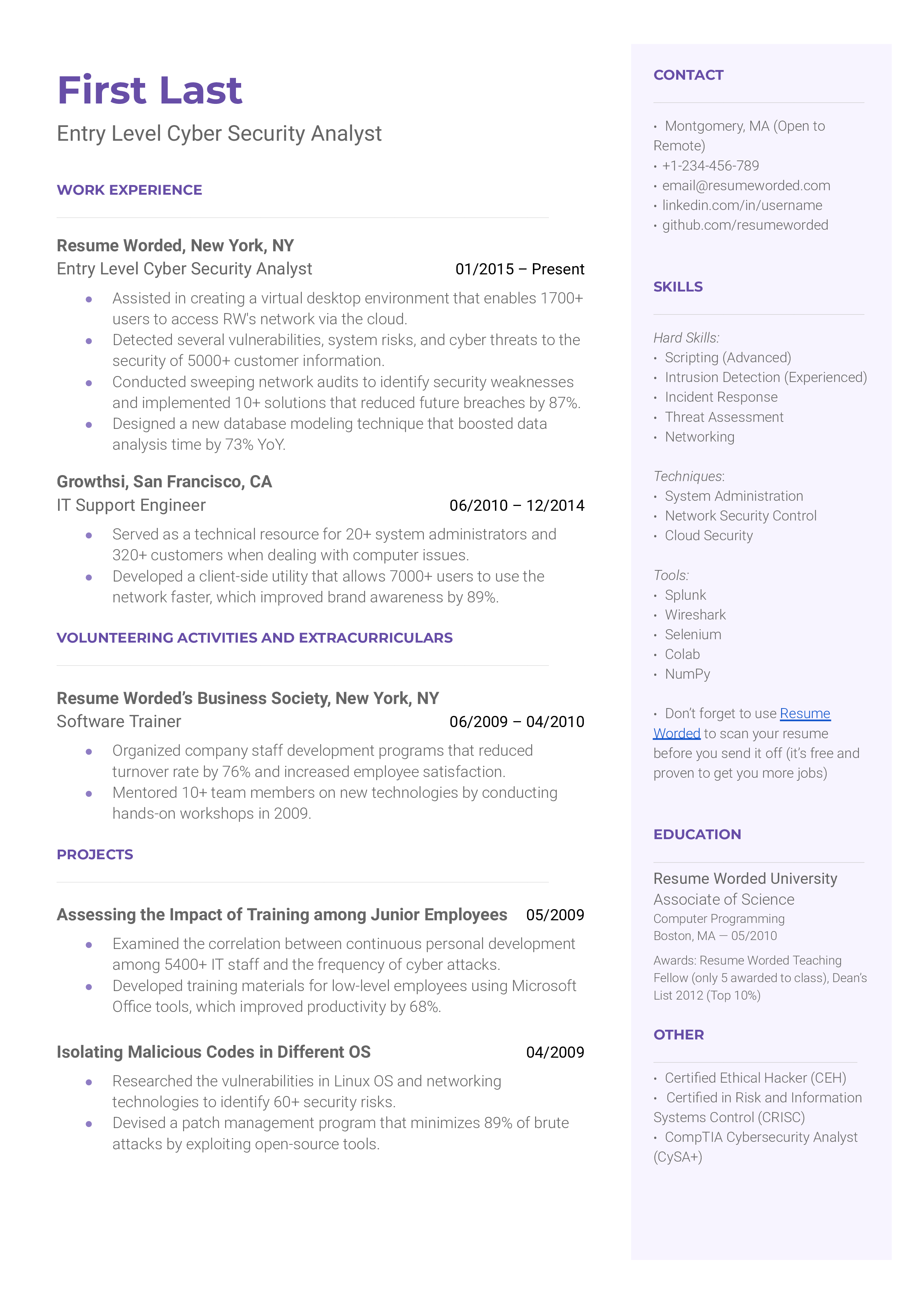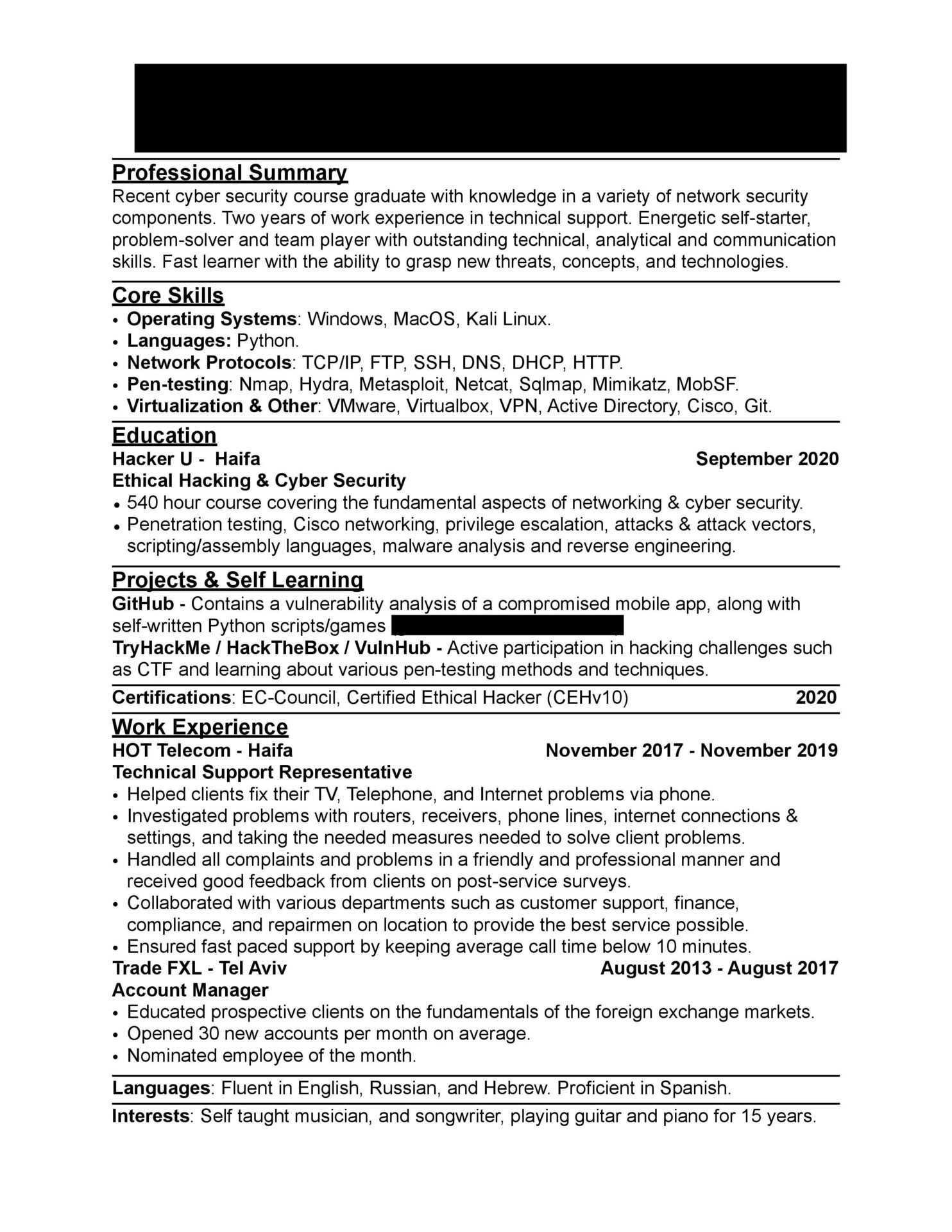As a Cyber Security Analyst Entry Level, your role is to monitor and analyze security threats. Your responsibilities include identifying vulnerabilities and implementing security measures to protect digital assets.
In this role, you’ll play a vital part in safeguarding sensitive information and preventing cyber attacks. Your expertise will contribute to the overall security posture of the organization, ensuring a safe digital environment for users and stakeholders. As you embark on this career path, your skills in threat detection and incident response will be essential for addressing potential risks effectively.
A career as a Cyber Security Analyst Entry Level offers dynamic challenges and opportunities to make a real impact in the world of cybersecurity.
Essential Skills For A Cyber Security Analyst
Cybersecurity is a rapidly growing field, and becoming a Cyber Security Analyst can be a lucrative and rewarding career path. However, to excel in this role, it is important to possess certain essential skills. In this article, we will explore some key skills that are crucial for an entry-level Cyber Security Analyst.
Knowledge Of Network Security
One of the most fundamental skills required for a Cyber Security Analyst is a strong knowledge of network security. Understanding how networks operate and the potential security risks they face is essential for protecting an organization’s sensitive data.
Network security encompasses various aspects, including:
- Identifying potential vulnerabilities in network infrastructure.
- Implementing and managing firewalls, intrusion detection systems, and other security measures to safeguard the network.
- Monitoring network traffic for any suspicious activities or signs of a cyber attack.
- Responding quickly and effectively to any network security incidents.
Having a deep understanding of network security protocols and practices allows a Cyber Security Analyst to effectively identify and mitigate potential threats.
Understanding Of Security Protocols And Standards
Another essential skill for a Cyber Security Analyst is a thorough understanding of security protocols and standards. This knowledge ensures that an analyst can implement and adhere to industry best practices, ensuring the confidentiality, integrity, and availability of an organization’s data.
Some common security protocols and standards that a Cyber Security Analyst should be well-versed in include:
- Transport Layer Security (TLS) and Secure Sockets Layer (SSL) for secure communication over the internet.
- Virtual Private Network (VPN) protocols for establishing secure connections.
- Common Criteria (CC) for evaluating the security capabilities of products.
- Payment Card Industry Data Security Standard (PCI DSS) for securing payment card data.
Understanding these protocols and standards is crucial for ensuring compliance and protecting sensitive information from unauthorized access or theft.
In conclusion, a successful Cyber Security Analyst must possess a solid foundation in network security and a comprehensive understanding of security protocols and standards. By continually developing these essential skills, an analyst can contribute to proactively safeguarding their organization from ever-evolving cyber threats.

Credit: resumeworded.com
Education And Certification Requirements
When pursuing a career as a Cyber Security Analyst, meeting the education and certification requirements is essential. Employers seek candidates with relevant degrees and industry-recognized certifications to ensure a solid foundation in cybersecurity. This article will explore the educational paths and certifications necessary to enter the field of cyber security.
Relevant Degree In Computer Science Or Information Technology
To embark on a career as a Cyber Security Analyst, obtaining a relevant degree is crucial. A degree in computer science or information technology provides the foundational knowledge required for understanding complex security issues. This education equips individuals with skills in programming, networking, and database management, essential for success in the cyber security realm.
Certifications Such As Comptia Security+ Or Ceh
In addition to a degree, aspiring Cyber Security Analysts should pursue industry-recognized certifications such as CompTIA Security+ or CEH. These certifications validate the individual’s expertise in areas such as network security, compliance and operational security, threats and vulnerabilities, application, data, and host security, and access control and identity management. Obtaining these esteemed certifications demonstrates a commitment to the field of cyber security and enhances career prospects.
Common Responsibilities Of Entry-level Cyber Security Analysts
As an entry-level cyber security analyst, you’ll be entrusted with various vital tasks that contribute to protecting an organization’s digital infrastructure.
Monitoring Security Systems
One of the key responsibilities of an entry-level cyber security analyst is monitoring security systems for any unusual activity. This involves keeping a close watch on network traffic, logs, and Mr. Cooper cyber security breach indicators to identify potential threats.
Conducting Vulnerability Assessments
Entry-level cyber security analysts are often involved in conducting vulnerability assessments to identify and address potential weaknesses in an organization’s systems. This involves utilizing various tools and techniques to detect and analyze vulnerabilities and provide recommendations for remediation.
Furthermore, entry-level cyber security analysts play a crucial role in GRC cyber security, ensuring that the organization complies with regulatory requirements and industry best practices relating to information security.
Conclusion
Entry-level cyber security analysts play a vital part in an organization’s defense against cyber threats. With their focus on monitoring security systems and conducting vulnerability assessments, they form an essential part of the cyber security team.

Credit: www.springboard.com
Tools And Technologies
As an entry-level Cyber Security Analyst, having a solid understanding of various tools and technologies is crucial for securing an organization’s digital assets. In this section, we will explore some of the key tools and technologies that you should be familiar with, helping you establish a strong foundation in the field of cybersecurity.
Understanding Of Firewalls And Intrusion Detection Systems
One of the fundamental tools within cybersecurity is the firewall. A firewall acts as the first line of defense against unauthorized access and potential cyber threats. It monitors traffic flow between networks, allowing only permitted data packets to enter or leave a system or network. By effectively configuring firewalls, you can prevent suspicious activities and protect sensitive information from falling into the wrong hands.
Intrusion Detection Systems (IDS) are essential tools used to identify and respond to potential security breaches. IDS works as an early warning system, continuously monitoring network traffic for any abnormal activity or invasion attempts. It scrutinizes packet headers, payloads, and behavior patterns to detect any signs of malicious activity. By promptly alerting security personnel of any suspicious events, IDS plays a vital role in preventing cyber attacks and limiting potential damage.
Knowledge Of Data Encryption Techniques
Data encryption is a critical aspect of cyber security and involves converting plaintext into ciphertext to make it unreadable to unauthorized individuals. Understanding different data encryption techniques allows you to secure data at rest and in transit, ensuring that even if intercepted, the information remains protected and unreadable.
Encryption protocols such as AES (Advanced Encryption Standard) or RSA (Rivest-Shamir-Adleman) are commonly used to secure sensitive data. A strong grasp of encryption algorithms and cryptographic mechanisms prepares you to implement robust security measures to safeguard critical information from potential threats, such as the Mr. Cooper cyber security breach that occurred in 2020.
Whether encrypting communication channels, protecting databases, or securing stored files, knowledge of data encryption techniques is vital for maintaining data integrity and confidentiality, and contributing to an organization’s GRC cyber security (Governance, Risk management, and Compliance).
Best Laptop For Cyber Security
While not a specific tool or technology, choosing the right laptop is crucial for efficient and effective work as a Cyber Security Analyst. A laptop with sufficient resources is necessary for running complex security tools and applications, analyzing data, and conducting vulnerability assessments.
When it comes to selecting the best laptop for cyber security, consider factors such as processing power, sufficient RAM, high-quality graphics, and storage capacity. Additionally, having a robust built-in firewall and strong malware protection is essential to preventing access to your system by malicious actors or unintentional exposure to cyber security memes.
Investing in a reliable and secure laptop ensures that you have the necessary hardware to perform tasks efficiently, contribute to strengthening an organization’s security infrastructure, and effectively protect sensitive data from potential cyber threats.
Career Path And Advancement Opportunities
Entering the field of cybersecurity as an entry-level analyst sets you on a path filled with immense potential for growth and advancement. As technology continues to evolve and cyber threats become more sophisticated, the demand for skilled professionals is on the rise. By specializing in specific areas of cybersecurity and pursuing advanced certifications or a master’s degree, you can open doors to exciting opportunities and establish yourself as a highly sought-after expert in the field.
Specializing In Specific Areas Of Cybersecurity
As an entry-level cyber security analyst, it’s crucial to develop a solid foundation in the fundamentals of cybersecurity. However, to advance your career and stand out in the competitive job market, specializing in specific areas of expertise is highly recommended. By focusing your efforts on particular areas, such as network security, data privacy, digital forensics, or malware analysis, you can become a go-to professional in a niche field.
Pursuing Advanced Certifications Or A Master’s Degree
To demonstrate your commitment and expertise in the field, acquiring advanced certifications or pursuing a master’s degree can significantly enhance your career prospects. Industry-recognized certifications such as Certified Information Systems Security Professional (CISSP), Certified Ethical Hacker (CEH), or Certified Information Security Manager (CISM) solidify your knowledge and validate your skills to potential employers.
Add to this, pursuing a master’s degree in cybersecurity provides you with a more in-depth understanding of the field, equipping you with the knowledge and expertise needed to tackle complex cyber threats. Additionally, a master’s degree can open doors to higher-level positions such as security architect, security consultant, or security manager.
It’s important to note that while certifications and advanced degrees can enhance your career prospects, hands-on experience and continuous learning remain essential in the ever-changing world of cybersecurity. By staying updated with the latest trends, industry best practices, and emerging technologies, you can stay ahead of the curve and continue to grow as a cyber security analyst.

Credit: uk.indeed.com
Frequently Asked Questions On Cyber Security Analyst Entry Level
What Does A Cyber Security Analyst Do?
A Cyber Security Analyst is responsible for protecting computer systems and networks from potential cyber threats. They analyze security risks, monitor for any breaches or vulnerabilities, and develop and implement security measures to safeguard sensitive information.
What Skills Are Required For A Cyber Security Analyst?
A Cyber Security Analyst should have strong analytical and problem-solving skills, as well as a deep understanding of computer systems and networks. They should also have knowledge of programming languages, risk assessment tools, and the ability to stay updated on the latest cyber threats and trends.
How Do I Become A Cyber Security Analyst?
To become a Cyber Security Analyst, you typically need a bachelor’s degree in a relevant field such as computer science or information technology. Additionally, earning certifications such as Certified Information Systems Security Professional (CISSP) can enhance your career prospects in this field.
What Are The Career Opportunities For A Cyber Security Analyst?
Career opportunities for Cyber Security Analysts are growing rapidly, as organizations increasingly recognize the need for strong security measures. They can work in various industries such as finance, healthcare, government, and consulting firms. Additionally, there are opportunities for advancement to roles such as Security Architect or Security Manager.
Conclusion
Becoming an entry-level Cyber Security Analyst requires a strong foundation in IT knowledge, critical thinking skills, and a dedication to keeping up with the ever-evolving cybersecurity landscape. By obtaining the necessary certifications, gaining practical experience, and developing a proactive mindset towards identifying and mitigating cyber threats, aspiring analysts can pave the way for a successful career in this field.
Stay updated, stay curious, and embrace the challenges that lie ahead to make a valuable contribution in protecting organizations from the constant threat of cyber attacks.

